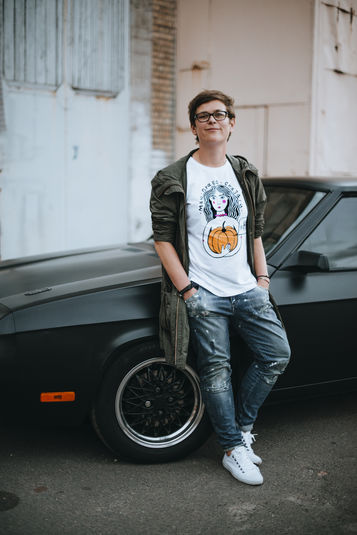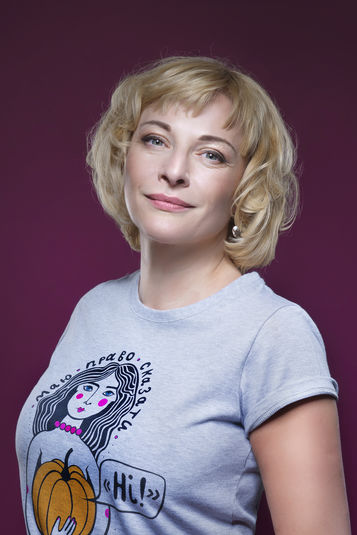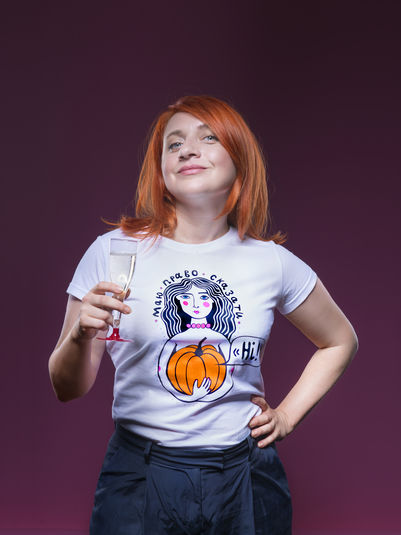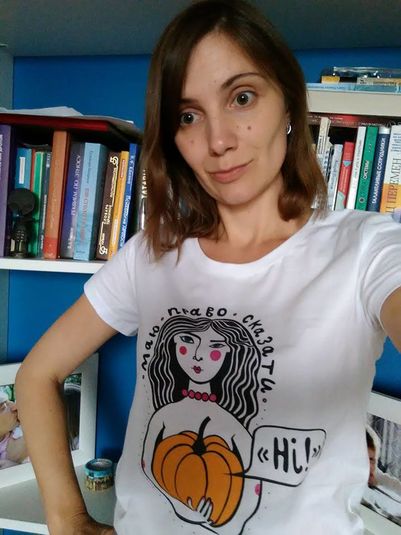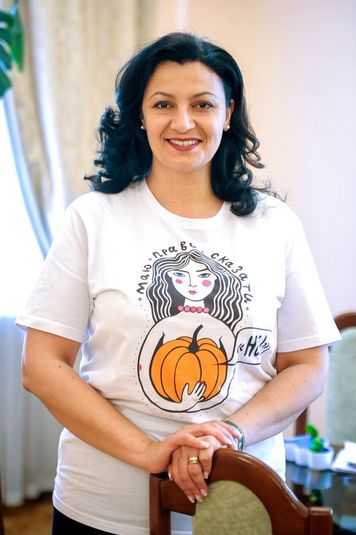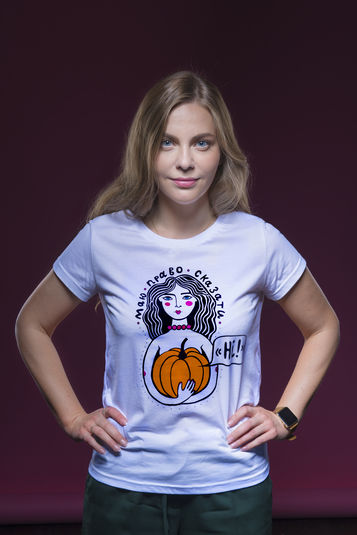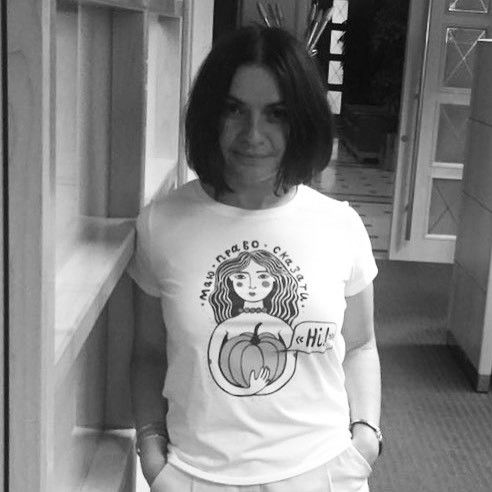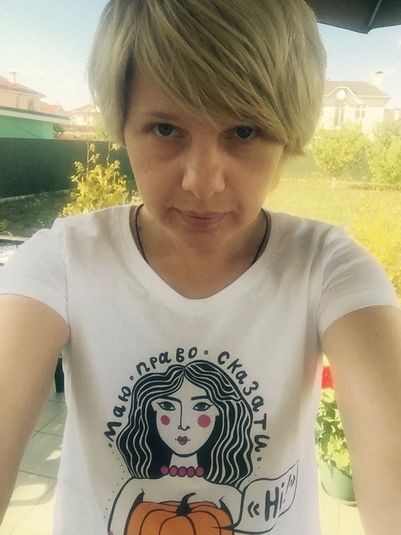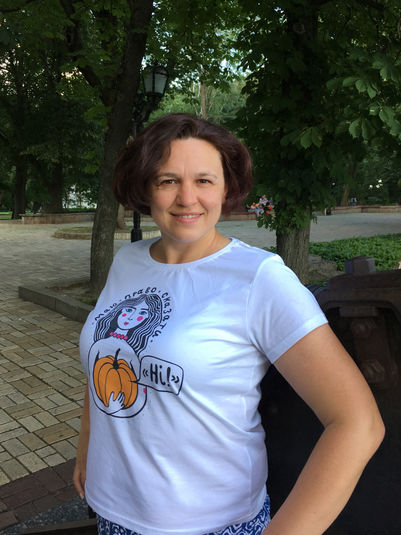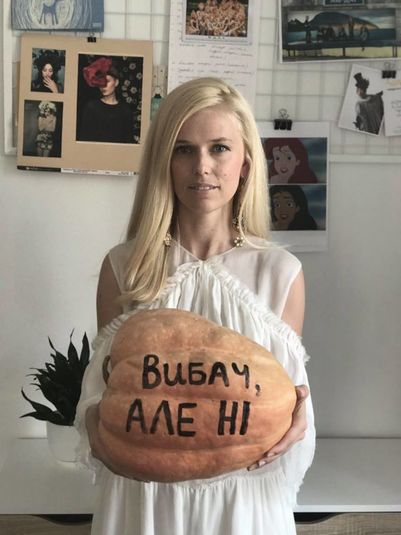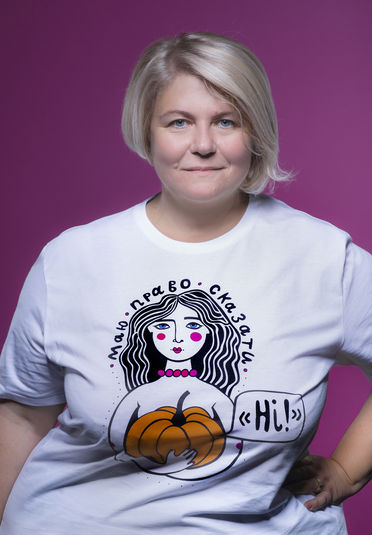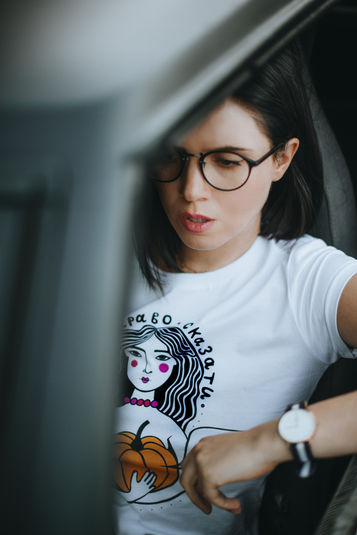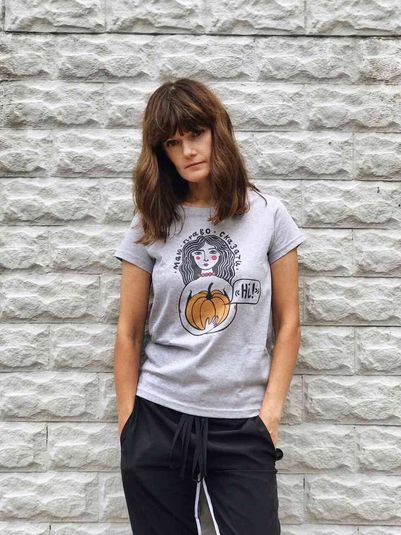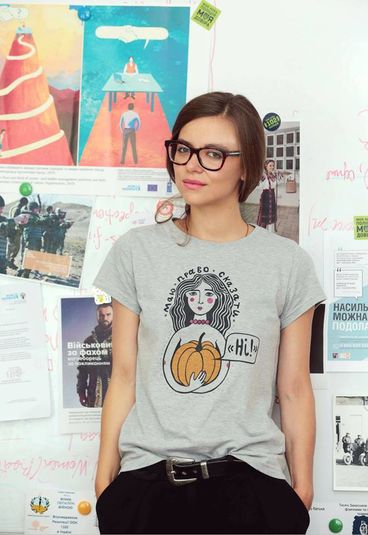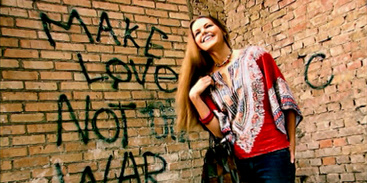Ukrainian girls learned the art of saying "No!" through the flash mob
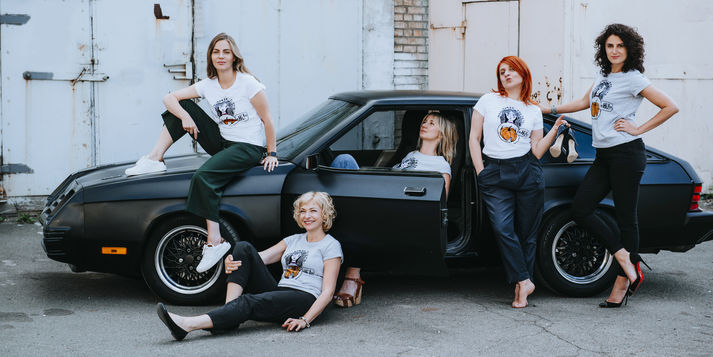

Dozens of well-known Ukrainian women who have told their stories have taken part in the flash mob. The first five of them will be published in "Ukrainian Pravda. Life ", dedicated to the girls who found the cause of their lives, due to their ability to say "NO!".
Facebook flash mob has received active support from the Ukrainian female Instagram community - popular Ukrainians post their photos on Instagram dressed in T-shirts of the project and with the hashtag #ihavetherighttosayno. In fact, not just media stars, but everyone interested can join the project.
T-shirts and eco-bags with the print "I have a right to say NO!" can be found on the website fashion-aid.in.ua. All raised funds will be directed to projects for HIV-positive children.
This is not the first creative project of ANTIAIDS Foundation aimed at young women. In 2004 Foundation commissioned launching of the informational campaign "Learn to Say NO!" on the national TV channels. The purpose of that campaign was to support the girls' ability to refuse risky sexual practices and to adhere to safety rules in their personal relationships.
HOW UKRAINIAN GIRLS WERE FINDING THEIR LIFELONG PURSUIT
Olga Dukhnych, journalist, psychologist
When I was working at the university in Crimea, the "good" Komsomol trend was to bring in teachers to the Vice – Principal of Education office and "educate" them.
He was stupid, but diligent. He tried to educate teachers on how to tell on their students. For example, those students who did not comply with the university authorities, city authorities, or the Government of Crimea due to their political views. Now the things are much worse there.
Those disgusting conversations went like this: "Well, you're the daughter of our professor, you're working with us ...". In my case those conversations were short. Closer to the events of Maidan the situation became more acute. This isn’t even a story about how to say “no”. This is a story about how to distance yourself and forget.
But the right to say "no" is important. It is crucially important when your right to have personal space, to have private property, to your body, to your opinions, to your plans for the future is violated.
It just happened that in the Soviet culture it was shameful to say “no”. Many people of my parents and my age cannot say "no". But even now, on the playground, we do not teach children to say "no" when they don’t want their things to be touched or when they are forced to kiss and hug strangers. We confuse politeness with complaisance, openness with our own boundaries and personal space and that is what we teach our kids.
For some reason it's harder for women to say "no", but believe me, there are plenty of men who cannot say "no" neither. And that is why I will be teaching my little girl to say "no", to refuse the offer if you don’t like it, to leave a bad play or a bad life situation.
Ivanka Klympush-Tsyntsadze, Vice Prime Minister of Ukraine for European and Euro-Atlantic integration
Well, I am admitting to you girls – initiators of the flash mob that I have not bought the T-short yet and I don’t have a nice photo wearing it either. But I will share my story with you to support your #ihavetherighttosayno. It happened almost 20 years ago.
... I graduated from the Institute of International Relations (IIR) with honors and received Bachelor’s and Master’s degrees. I was invited to continue my postgraduate studies there.
And so, I did.
It was back in 1998.
As always, I passed my exams with flying colors and started choosing the topic for my decertation.
As soon as the Charter on special partnership with NATO was signed (incidentally, I wrote a piece about it in my decertation) the new trends in the European security zone begin to surface. What could be more interesting, more promising than beginning to dig deeper in this direction?
I made up my mind and received an external scholarship to go to the University of Brussels for scientific research for several months. I spent several months digging in the libraries of Brussel’s Universities. I conducted dozens of interviews with foreigners and they were genuinely surprised that someone in Ukraine wants to analyze the future development of the security system in Europe. Then there was a Western European Union with the unclear future. Obviously, North Atlantic Alliance existed at that time, but its prospects of the extension to the countries of Central Europe were not clear. The horizon of vision for Ukraine just started to be outlined .... A whole 1 (!) monograph was written for Europe and the USA in the realm of my research at that time.
I returned home inspired, with a huge suitcase of copied articles (we didn’t have flash drives back then) and a bunch of recorded interviews...
I had to start preparing for the approval of my topic, then focus on research work. And it was all right, up until the Head of our department in IIR invited me to have a conversation prior to the science council meeting...
And there it began... Why do you care about European security system? It is necessary to write essentially about Ukraine in international relations. We shouldn’t be writing about things of no concern to us.... Isn’t your father an ambassador to a Central European country currently? Shouldn’t you be writing about Ukraine and Central European countries? Ukraine should definitely be part of this topic, that’s is why your decertation should be going in that direction...
The department can not recommend a topic about international relations without Ukraine... We really need such focused postgraduate students, but you must change the theme... Women shouldn’t be writing about security in general...
The conversation lasted a good hour and a half...
I left the room and went to retrieve my documents because I wasn’t going to write about anything other than security, and so I decided to say NO to the graduate school...
I took back my documents and I have never returned to a purely scientific work. Even when the Head of our department returned from a long business trip overseas, I was invited to continue my postgraduate studies and choose any subject I want. Since then, security, namely European and world security has always been at least a part of my job description.
Obviously, today we really need specialists who understand these issues...
P. S. Found a photo from those times :)
Olesya Zhulynska, PR Director of "Coca-Cola Ukraine"
And now it’s my turn to SHARE!
My family is very liberal: my parents didn’t scold me about bad grades, they didn’t control where and who I played tennis in the evenings with, nobody was forcing me to marry and they didn’t complain about not having grandchildren.
At the first glance everything was very free and easy, but every girl, every woman surrounded by the stereotypes of the society has her own story, even if those stereotypes were not imposed by the father or the mother.
At the first glance my story is typical. It's about choosing a profession at the age of 16. That’s when my parents’ experience and influence came in play. I dreamed of being an actress. I danced to Alla Pugacheva, read Shakespeare, went to a theater studio and tried to read love poems without actually having an experience in love or being hurt. Bright memories and experiences still help me in my profession. After evaluating all the aspects of my potential profession dad advised: "Choose legal profession, it’s the same as the theater only pays better". The beginning of the 90s, changes, lack of money, stores that don’t even have eggs, dad in high office – are you really going to fight for your dream under these circumstances? I didn’t even have a second thought, and perhaps for the first time I betrayed my dream.
But I clearly remember when I allowed myself to say: #ihavetherighttosayno for the first time in my life. I graduated from the law school, wrote a decertation and even studied in the USA. And here we were with my friends in New Orleans: jazz, cocktails, chairs nailed to the floor, sex shops, Creole cuisine, weird cemeteries and of course fortunetellers. To this day I remember the words of that black and skinny fortuneteller – voodoo dressed in turban on the city square: "This isn’t your profession, what are you doing pursuing it? You have completely different destiny. Communicate and communicate a lot"… But no, I've invested so many years and efforts in my education, I have so many opportunities. It seemed that those words were a simple trick caused by an alcohol and a couple of dollars. But they got stuck in my memory. Upon my return to Kyiv I had to promptly expand my legal horizons. And accidentally I was recommended to Coca-Cola Beverages Ukraine. And I started from scratch as an assistant director. I worked from 8:30 and seemed till 8:30 am the next morning. I traveled an entire Ukraine, I cleaned a lot of refrigerators, I placed a bunch of products on the shelves, i came up with a crazy number of projects and went to the bunch of government agencies. And after a year and a half of this crazy work my boss comes up with a fantastic offer in his opinion – you will be a company lawyer. For the first time in my life I said "NO". Even now I understand how high the risk was of me being kicked out from the Company of my dreams. But I dared and I didn’t regret it. And then my boss took a risk and threw me like a kitten into the field of public relations. But this is a completely different story. The story about risk, overcoming fear, destroying all of the accumulated experiences and looking for and finding myself. That's how I found myself in the field of "Communicate and communicate a lot"...
Olesya Drashkaba, graphic artist, expert in communications and creative technologies
When I heard about the idea #ihavetherighttosayno from Olga Rudneva and Olesya Zhulynska, I immediately knew that I wanted to be a part of the project and created this print. After all, it is a story about the fact that Ukrainian women historically had the right to give pumpkins as a sign of refusal to the relatives of the guy, who wanted to propose to her. This story isn’t just about a tradition, but about the human right, choice and freedom. Now I say NO often (one may get an impression that I say it too often). But I started just recently. I grew up in a very free environment surrounded by mountains, rivers, games and lots of friends. Moving to the city and getting to know my new school was a big shock to me. On the second day of school I realized that no one there was interested in my thoughts, my wishes or my choice. School and my new life became the first thing I couldn’t say NO to. And then I cheated a little – I became a straight A student. Not just an excellent student, but an ideal student! I was getting an A+ in all subjects and I took tennis, ballet, drawing lessons, went to musical school, participated in school Olympiad during my senior years, went to excursions to the Shevchenko Museum, participated in the school self-government etc. It required mobilization and took time, but it also gave me the opportunities to express my thoughts, skip some lessons, read the books I loved, argue with the teachers, and go where I wanted to go. The great ability of the Soviet school to give some freedom to the honors students and to the worst students as well.
"A good girl" is a social role that many choose simply because there is lack of choice. Good girls are obedient, they rarely refuse, but they lie a lot )) First of all, to themselves.
I lied to everyone around. That’s why I had a chance for salvation and I used it right after 9th grade. I left from school for the art college. All lecturers gathered around me when I was filling in my application. The principal asked me the question: "Don’t your parents have enough money to help you go to law school?" ))
After school I said NO to my life at home and went to live on campus. Then I said NO to the Lviv Academy of Fine Arts and went to the one in Kyiv. There I often said NO to jobs, partners, circumstances. But by 2014, I couldn’t say YES to my own character, my own freedom, and the life that I really wanted. Maidan, which began with a great NO gave me strength to accept myself as I was: emotional, with a frequent mood swings, sometimes aggressive, but most importantly – free and strong! At first, I was incredibly hesitant. I quit my work, broke off with my boyfriend, broke a lot of ties. I let go of my emotions and my failures and at the same time I was terribly scared). Later it turned out that if you live your life guided by your desires and choices then everything quickly becomes normal. Emotions that you feel become more pleasant, thoughts that you say out loud do not break the relationship, your strength helps you instead of pushing away (and if it does pushes someone or something away, then you didn’t need it in the first place), friends are getting closer, and work is becoming meaningful and interesting. Therefore, the right to say NO it's no longer an objective per se for me. It's just a resource to say YES!
Julia McGuffy, Editor-in-Chief of the Charitum project
#ihavetherighttosayno
I couldn’t always say "no" to put it mildly, especially at work. But I had to learn. I became Editor-in-Chief of korrespondent.net in the fall of 2008. My new post brought half a million calls a day asking "to remove / install / edit the news".
Sometimes calls were accompanied by screams mixed with threats of prosecution. Although we had nothing to be prosecuted for. I remember very well when I was yelled at for first time. Somebody from the press service of the well-known politician at that time was yelling at me for no serious reason. I told them that I wouldn’t change or take down anything, and I cried later that evening because nobody talked to me like that before. But you know, the next morning which I remember very clearly, I got up with a deep feeling that I will not cry anymore. They can scream at me all they want, they can scream in my ear with megaphone. If I know that I am right, or we as a publisher are right, “no will mean no". We’ve always been willing to correct our mistakes and inaccuracies, but if someone was trying to push nonsense I always said "no" without getting upset. Later on, representatives of one famous politician came to me with an attempt to give a bribe. I walked them out of the meeting room with the word "no" and promised to call security.
And then Special Services Officer came trying to recruit me. He said he knows everything about me. He left with my "no".
I felt stronger with each rightful "no".
Later, after I left my beloved korrespondent.net, I have said "no" to job offers many times. Perhaps those were very good job offers, but I would be uncomfortable taking them. I kept repeating "no" and "no", having managed to refuse the whole market and escaped from a couple of jobs after a short cooperation. I am already used to the idea that not everything is mine and I will forever remain a "shot down pilot". But deep inside I believed that something was waiting for me somewhere. And it came! That’s it.
Yana Barinova, Executive Director of the Holocaust Memorial Center "Babyn Yar"
I support #ihavetherighttosayno project of my colleagues. In the framework of this flash mob I have to tell the story of my refusal. Voilà, my little confession... Three years ago, I lived and worked in France. I received my MBA there and was doing my postgraduate study in Sorbonne (that gives you a residence permit covering an entire period of your dissertation work for about 3-4 years). Then I went to work in Brussels for some time, where I had the opportunity to extend the contract with a leading consulting company. And then I lived in Paris again, doing my PhD... But it was time for my daughter to go to school. Living in Europe with my child did not seem real. Which school? Who is she with when I'm at work? We have no relatives there. What if I have to go on business trip? And how can I manage to write my dissertation? Paris is a dream city, but it's rather difficult to live there due to very high prices for everything. Most benefits only go towards residents. I had a difficult choice to make – drop everything and go back to Odessa, or leave the child with my parents and continue to pursue my career (seeing my progress my mother selflessly offered this option). Of course, I returned to Odessa. I said “no” to all these beautiful cities and amazing prospects. That time it seemed like I missed all of my opportunities. And I will never have another chance in life... I was desperate when I saw these contrasts and changes. I had to give up career aspirations in Europe. Yes, it was painful and it hurt. But I gained much more. In September 2015 I took Melissa to her first grade in Odessa. Later that month I came to a meeting where we discussed the idea of creating the Holocaust Center in Ukraine. It was a fateful meeting. We moved to Kyiv together. I've been working on this great project for two years now. And most importantly I live with my child. And only I know how many sacrifices and compromises I made to be at the point where I am today. But I am happy, happy as never!
Photogallery















